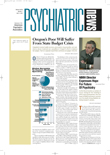Remember being pulled out of algebra class for vision and hearing tests? Routine health screening procedures for school students have long sought to detect problems that interfere with the learning process. Seldom, however, have these tests screened students for mental health problems such as depression, which commonly result in poor academic performance, low self-esteem, and social isolation in adolescents. And while hearing and vision problems are not fatal, depression can lead to suicide in young people.
In recognition of the fact that as many as 750,000 adolescents in the United States live with depression, and as many as 80 percent go undiagnosed and untreated, leaders of Columbia University’s TeenScreen Program and mental health advocacy group Positive Action for Teen Health (PATH) have united with an ambitious plan—to screen every American teen for depression. Both PATH and TeenScreen are housed in Columbia University’s department of child and adolescent psychiatry
“The more silent disorders such as anxiety and depression often go undiagnosed and [are] dismissed as being part of normal adolescence,” said David Shaffer, M.D., director of the division of child and adolescent psychiatry at Columbia University in New York. “If depression goes untreated, which it often does, there are many adverse consequences.”
Shaffer established Columbia’s TeenScreen program more than a decade ago and appeared at a press conference in Washington, D.C., in February with PATH leaders to build support for the screening.
Teens with depression tend to be irritable, show low self-esteem, and withdraw from their family, friends, and social activities, which minimizes their support systems, Shaffer noted. They may also experience more aches and pains than nondepressed peers. “The outside manifestations are frequently nonspecific and don’t suggest depression to the average parent,” he added.
Adolescent depression is also directly or indirectly linked to about 1,700 suicides in the United States each year, according to Shaffer. For youngsters and adults aged 10 to 24, suicide is the third-leading cause of death, following car accidents and homicides.
The TeenScreen initiative began 12 years ago when the National Institute of Mental Health linked with Columbia University to find a new approach to identifying teenagers at risk for suicide.
TeenScreen is unlike other suicide prevention efforts in that it does not attempt to educate youth about suicide. In his research on a number of suicide awareness programs, Shaffer found that discussing suicide with teens can be risky because some are sensitive and may misinterpret what is told to them. “We avoid any direct discussion with teens about suicide,” he said.
Instead, TeenScreen takes what Shaffer described as a “passive approach” by using a series of mental health surveys to determine whether students—mostly ninth and 10th graders—are at risk for depression and suicide.
In schools that employ the screening, students must first get their parents’ written consent to be taken out of class to complete the TeenScreen, a brief paper-and-pencil survey that includes questions about depression, substance abuse, suicidal ideation, and past suicide attempts.
Students who score positive on any of the TeenScreen questions are more thoroughly assessed with the Voice Diagnostic Interview Schedule for Children (DISC).
The Voice DISC is a computerized, self-administered, psychiatric interview that uses DSM-IV criteria to create a diagnostic profile of participants.
Students who screen positive for symptoms of depression or suicide by the Voice DISC then see a mental health professional such as a school counselor for a brief interview.
If the counselor determines that the teenager needs additional mental health services, he or she is then connected with a case manager who helps the teen access mental health services in the community.
So far, more than 10,000 students have completed the screening, and 10 to 15 percent of those have been referred for treatment.
“We are about promoting the notion of mental health checkups for kids,” said national PATH director Laurie Flynn, who spoke at the press conference with Shaffer. “Our goal is to offer every youth in America the opportunity to be screened for depression and risk of suicide.”
Flynn, who served as the executive director of the National Alliance for the Mentally Ill for 16 years, was once the unsuspecting parent of a suicidal daughter. “I would never want a parent to go through what I did the day I admitted my daughter to the hospital. . . .There is nothing more terrifying, frankly, than having your teenager attempt to take his or her own life,” she said.
Flynn said the support of parents and families is crucial to depression screening for teens and shared the results of a PATH survey of 900 American parents showing that almost three-quarters of the sample would support screening for risk of depression and suicide in high schools.
However, Flynn noted, the results also showed that parents may be overconfident about their own screening abilities: nearly 90 percent of parents surveyed said they would be able to tell if their teenager was depressed, but about the same proportion do not think other parents would know if their children were depressed.
With the help of private donations, leaders of the Columbia screening program have provided consultation, training, and screening materials free to 66 communities in 26 states and hope to reach 400 more communities in the next couple of years, Flynn said.
Three-way partnerships between PATH, state mental health officials, and schools in a number of states have successfully bolstered screening rates. In addition, fast-food restaurants in many communities have chipped in with free meal coupons for students who take the depression screening as an added incentive.
PATH’s plans to more than quadruple depression screening sites in the coming years concerned some at the press conference because they doubted that communities have the resources to treat the newly identified teens.
“We work within each community to engage public and private mental health providers so we know a suicidal teen can be seen that day or that another adolescent in need can be seen that week,” Flynn assured the audience. She offered an analogy. “We can’t tell women we won’t do mammograms because we aren’t sure we have the right treatments [for breast cancer],” she said.
Since depression results in “enormous suffering and unnecessary and tragic death,” she added, “parents and children have a right to know about it.”
More information about Columbia University’s TeenScreen Program is posted on the Web at www.teenscreen.org/teenScreen/program.html. ▪


